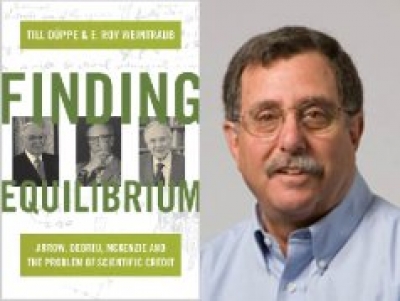Weintraub Completes History of Equilibrium Project

17 July 2014 3:59PM
Students of economic theory may be familiar with Arrow-Debreu’s model of general equilibrium, but they likely have not given much thought to the men – both the eponymous and the unnamed – who constructed the proof that transformed the field of economics post-World War II.
Professor E. Roy Weintraub, with Till Düppe of the Université du Québec à Montréal, has published a new book on three economists’ quests to prove the existence of competitive equilibrium. “Finding Equilibrium: Arrow, Debreu, McKenzie and the Problem of Scientific Credit” completes Weintraub’s five-book project on the development of modern economic theory.
Kenneth Arrow and Gerard Debreu collaborated during 1952-1953 to prove that a model of a competitive market economy may possess a set of equilibrium prices, and both later won Nobel prizes for their work. Working separately, Duke University’s Lionel McKenzie established the same result, published it first, but never received such public recognition.
“(Düppe) and I explore the lives and work of these economists and the issues of scientific credit against the extraordinary backdrop of overlapping research communities and an economics discipline that was shifting dramatically to mathematical modes of expression,” Weintraub said. “In telling this story, we broke new historiographical ground.”
Weintraub and Düppe used recently opened archives to construct the story. They have been lauded by Mary S. Morgan of the London School of Economics and University of Amsterdam for their use of history to show “how personal mathematics is: how the commitments of economists, and their personalities, are expressed in their mathematical accounts.”
“Düppe and I are writing for three audiences, really: economists, historians of economics, and historians of science,” said Weintraub. “We’re delighted that it is being well-received in all three communities. We’re especially pleased that it’s a history that appeals to economists.”
Indeed, Harvard’s Jerry Green has written that the book offers “remarkable insights into the workings of the economics profession (and) illuminates the interplay between the personalities of the researchers, the structure of their ideas, and the historical events of their time."
Learn more about Professor E. Roy Weintraub at his profile page.
